What are the Best Foods to Eat Before a Half Marathon?
Those months of training and dedicated practice have prepared you well for your upcoming half marathon.
BUT… to complete the package, have you remembered to include a proper nutrition plan for the foods you’ll want to eat immediately preceding the big race?
This is so important for all endurance athletes!
Whether you’ve run many half marathons or this is your first half marathon, being well-fueled for this demanding long race is essential to prevent premature fatigue while providing fuel to meet these demands.
Endurance, energy levels, hydration and recovery can all be affected by the foods consumed before your race making nutrition an essential part of your preparation.
Keep in mind that while this article focuses on the meal right before your half marathon, ideally, implementing the right foods even several days to a week before your big race, will serve you best.
Before hungering hunkering down on some of the best beneficial foods, let’s first cover a few other considerations.
pre-race nutrition tips
1. have a plan
It should go without saying that it’s best to have a plan ready well before needed.
Having a predetermined plan will allow implementation in plenty of time to reap the benefits.
As Benjamin Franklin once said, “By failing to prepare, you are preparing to fail.”
Read on to prevent that from happening to you.
2. remain consistent
The days before your half marathon are not a time to experiment.
Figuring out foods should be done early on and then it’s a good idea to stay consistent right up to the starting line.
Note: Your portion size will increase to meet the demanding long training run and the actual race, but specific foods should not be altered later in your training schedule.
3. control portions
While you will want to increase your portion sizes depending on your age, gender, weight, and half marathon goals, avoid overeating.
Overeating will make you sluggish and uncomfortable. Not a good way to start your half marathon.
If you are not sure how much you should be eating before a half marathon, the 6 Week Half Marathon Challenge and the Eat Like a Marathoner Nutrition Course both give you access to calculators to help you determine this!
4. Tune into your body
It’ll be helpful to pay attention to how your body responds to different foods.
Adjust your pre-race meal according to the responses you’re receiving with various new foods.
This is another reason to figure out the right foods well in advance - it takes time!
components of your food plan
For optimal performance, it is necessary to include the following components in the meal before your half marathon as well as the preceding days.
1. carbohydrates
Scientific studies repeatedly show that, for high intensity activities, carbohydrate intake should be increased to fuel endurance performances.
High intense activities obtain their primary source of energy from carbohydrates.
(Fat is the preferred method for low intensity activities. This is because to fuel lower intense activities, fat uses a lot of oxygen. Obviously, oxygen is more abundant when you’re working at a lower intensity.)
When running long distances, consumed carbohydrates are converted to glycogen and stored in your muscles and liver as glycogen.
The glycogen is then broken down to produce energy.
Once the glycogen stores have been used, your body turns to fat to obtain energy which, as stated above - requires oxygen - oxygen that, at this point, you’re struggling with.
So, with the demands of the high intensity half marathon, you will ‘hit the wall’ without stored carbs!
Consuming about 70% of your total calories from complex carbohydrates will sustain energy levels and should be the foundation of the meal eaten before your race.
In fact, be sure to start a loose carb loading plan about three to four days prior to race day for best results. You want to make sure you have plenty of stored carbs to get you through those 13.1 miles so make sure to be well supplied!
Don't overthink this, just keep in mind that you want the majority of your calories that you are eating to come from carbs!
2. protein
Although not the main energy source for endurance activities, protein does play a crucial role in repairing and maintaining muscle tissue.
A moderate amount of lean protein is recommended before your half marathon to prevent muscle breakdown during the race and to aid in recovery afterwards.
3. hydration
While not a food, hydration is as equally important as food.
Your body will function optimally with the proper fluid balance.
You definitely want to avoid dehydration as it can lead to decreased performance, muscle cramps and other health issues.
A good ‘ole bottle of water, as well as sports drinks that contain electrolytes and some carbs, will do the trick.
-And don’t get mixed up with sports energy drinks and trendy energy drinks. A trendy energy drink such as monster contains sugar and too much caffeine and no nutritional value. Steer clear!
One word of caution though: To prevent uncomfortable bloating and the need for frequent bathroom breaks, avoid excessive water intake right before the race start.
So - no chugging immediately before the race!
A good strategy is to drink about 16 to 20 ounces of water 2 to 3 hours before the race and then another 8 to 10 ounces about 20 to 30 minutes before the start.
4. electrolytes and essential nutrients
Including electrolytes and essential nutrients will help maintain fluid balance, muscle function, nerve function and overall performance.
Think sodium, potassium and magnesium.
Electrolyte-rich foods such as bananas, oranges, nuts and seeds will also supply what’s needed.
5. healthy fats
Although fats provide a concentrated source of energy, they do take longer to digest.
Small amounts are recommended but be careful by limiting them to prevent digestive issues.
Here is more information on fats role for runners.
when to eat before your half marathon
It is important to correctly time your pre-race meal.
Digestive discomfort results when eating too close to the race.
Your body needs enough time to digest the food and convert it into energy in order to avoid gastrointestinal or general discomfort issues during the race.
And yet if eating occurs too early, you might end up not having enough energy.
Although most runners have their big meal at dinner the night before the race, still have it the day before but consider having it at lunch or make it a very early dinner to allow your body more time to process it.
Not only will you dodge that heavy feeling, you’ll also be able to sleep well with your body having to work less for digestion.
Here is a more detailed guide on pre-race meals.
Here are also some pre-race meal dinner ideas.
Then, about 2 to 3 hours before the actual race, have a lighter meal that consists of carbs, very moderate protein and, of course, water.
Here are some make-ahead breakfast ideas, perfect for before a half marathon race.
About 30 minutes before the race, for an additional energy boost, plan on consuming a small snack of easily digestible carbohydrates or, reach for the energy gels or chews. (With the myriad of gel and chew options, read up on the best ones here.) -And again supplement with water.
So to sum up:
early dinner the day before the half marathon
Aim for a normal size meal consisting mostly of carbohydrates with moderate amounts of protein and supplemented with essential nutrients.
At this point, as a half marathoner, you’re carb loading so aim for about 5 grams of carbohydrates per pound of body weight.
(Read this guide on carb-loading if you are running a full marathon.)
2 to 3 hours before the half marathon
This is your pre-race breakfast. Yes, you might have to get up extra early to eat in this time frame before your race but do it!
Consuming a light meal the morning of the race is a must to be properly fueled! To allow for a few extra zzzz’s, prep the food the night before.
This light meal will consist mostly of carbohydrates.
150 grams of carbohydrates is sufficient so a bowl of oatmeal or a bagel and yogurt or whole-grain toast with a small amount of peanut or almond butter will do the trick.
30 minutes before the half marathon
A simple snack will suffice.
what to eat before your half marathon
Nutritional needs and preferences are unique to everyone so make sure to experiment before training runs and then implement consistently after knowing what works for you.
the meal the day before the race
As a reminder, be aware that while carbohydrates are important and essential and a main component of your meal, make sure to include the other elements.
Below are a few meal options that you can use strictly as is, or, you can switch things up according to your preferences.
- A whole-grain sandwich with almond or peanut butter and banana slices and a side of yogurt.
- Grilled Chicken with brown rice or pasta or sweet potatoes and steamed vegetables.
- Pasta with marinara sauce and a side salad
- Turkey, sweet potato and a banana
- Grilled Fish with green beans and a potato
The following chart can also be used by mixing and matching an item from each of the following categories.
Choosing a different food from each group will ensure a nice balanced meal suited to you.
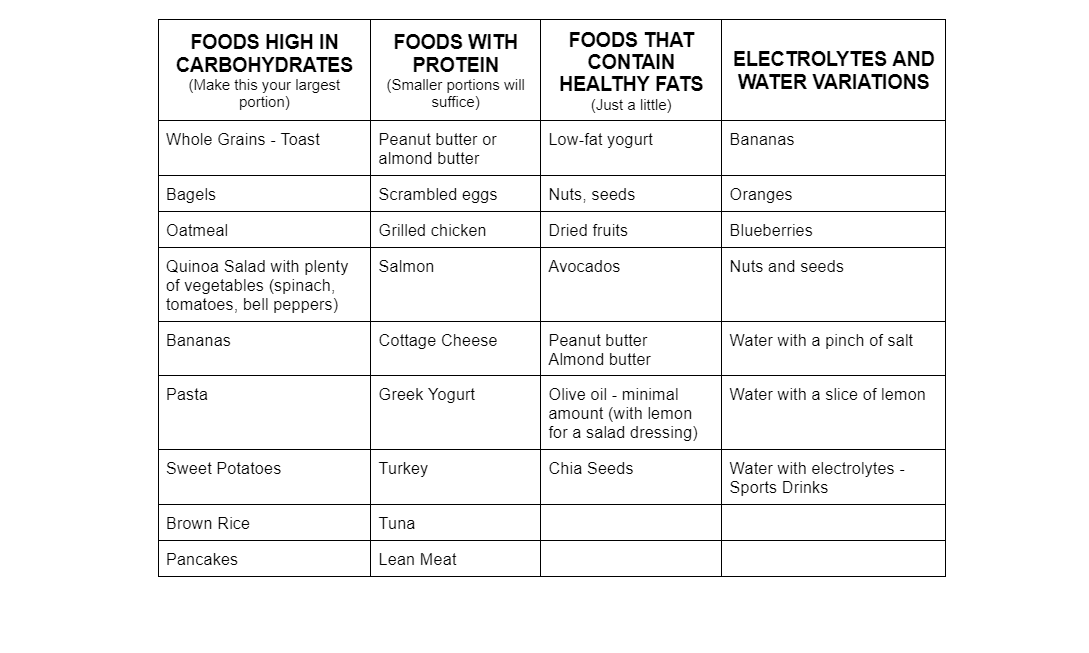
The Light Meal (Usually Breakfast) 2 to 3 Hours Before the Start of your Half Marathon
- Oatmeal topped with banana slices, a drizzle of honey and a sprinkle of chia seeds.
- An egg with whole-grain toast and a banana
- A Smoothie blended with a banana, berries, spinach, Greek yogurt and a small amount of almond milk.
- A Bagel with a small amount of peanut butter
The Snack 30 Minutes Before the Start of your Half Marathon
This is the time to top up your fuel stores. You want hunger under control and those blood sugar levels ideal. Think small and simple - something that doesn’t require your body to work hard to digest.
Recommendations:
- Banana
- Rice Cakes
- Applesauce
- Dried Fruit
- Pretzels
- Banana Muffin
- Energy gels or chews
- Energy bars
foods to avoid
Knowing what foods to avoid is as equally crucial as knowing what to eat.
Following are types of foods to run away from long before heading to the starting line.
These can lead to digestive system discomfort and energy crashes during the race.
foods high in saturated fats:
Fried chicken and other fried foods, sausage, bacon, red meat, cheese, butter, french fries, potato chips
refined sugars
Your energy will be zapped much more quickly by indulging in these.
Sugary drinks like soda and most fruit juices (tomato juice is the exception), all sweet treats.
spicy, greasy and acidic foods
These foods can cause gastrointestinal distress such as heartburn.
Garlic, onions, citric fruits such as grapefruit, oranges, pineapple, lemons, dairy, onion rings, French fries, pizza, cheeseburgers, green chilies, Mexican food, spicy chicken wings
excessive fiber
While fiber is good for you, having high-fiber foods before a big race can prompt GI distress such as an upset stomach, bloating, diarrhea and cramping.
This includes vegetables such as broccoli, cabbage, cauliflower, kale, brussel sprouts; fruit such as apples, berries; lentils and beans.
summary
So there you have it!
With a sound nutritional strategy in place, you’re well set-up for optimal performance and a positive race day performance.
-And it’s really not that hard to implement.
Just prioritize carb intake, include a moderate amount of protein, incorporate essential nutrients and electrolytes and stay hydrated.
Plan this pre-race meal thoughtfully, experiment with various foods during training, and then proceed to the day of the race with confidence and a well-fueled body that will carry you well all the way to the finish line!
Related Pages
👋Sign up to receive the free printable strength exercises for runners: 👇
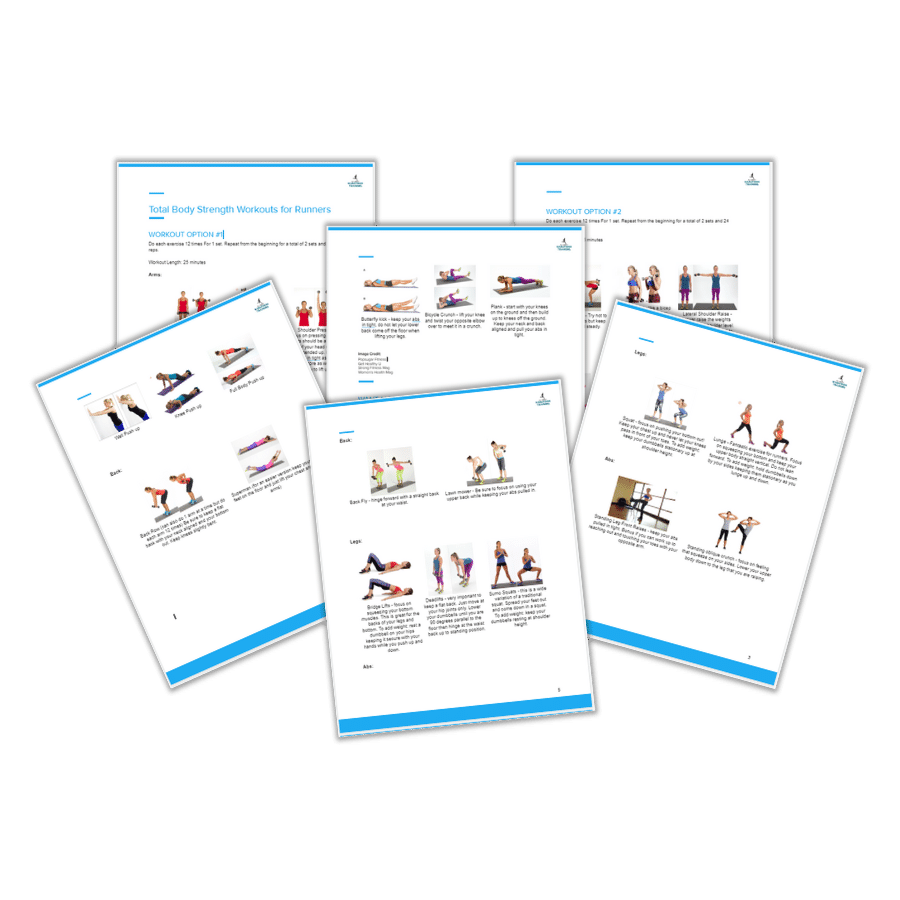 |
Your second block of text...
As featured on:

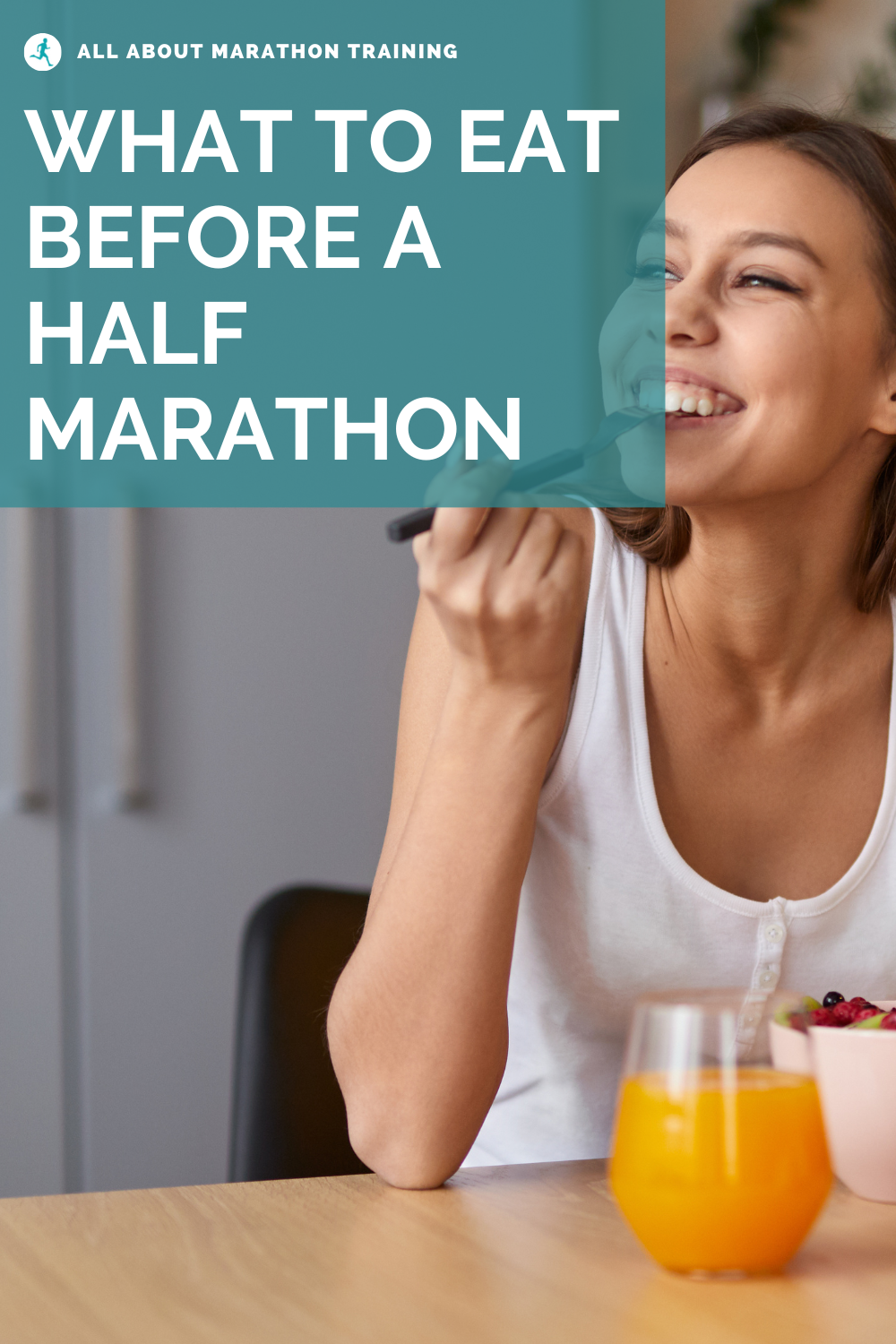
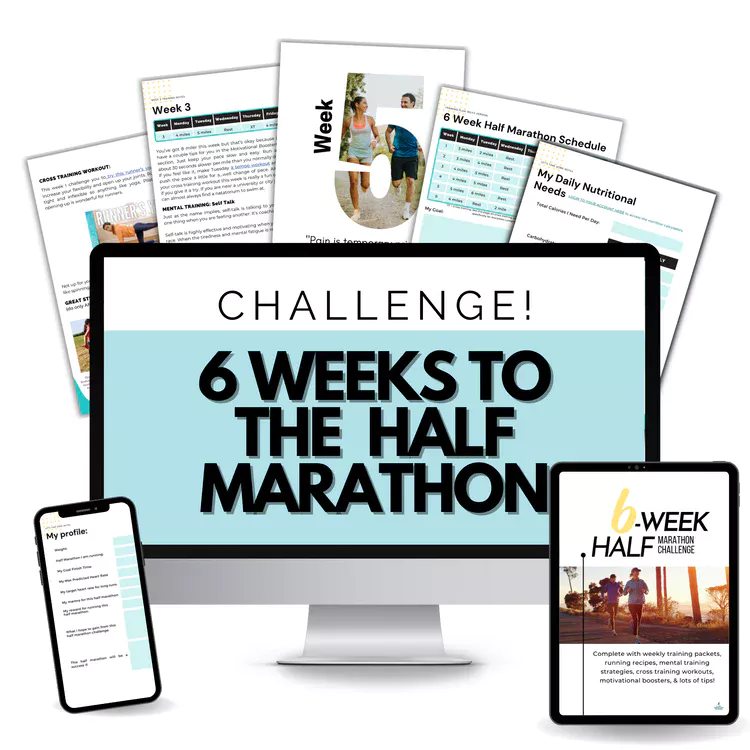
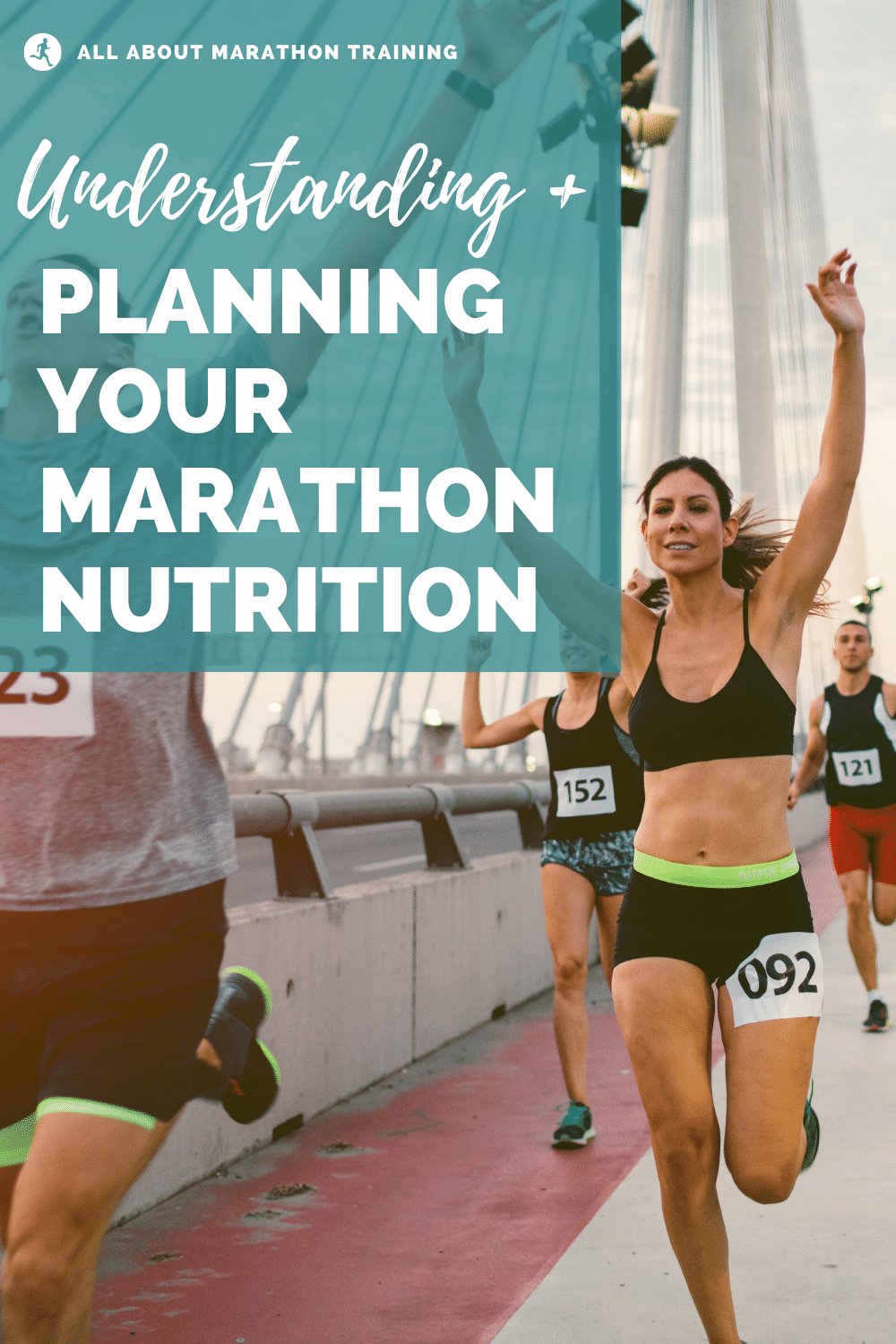

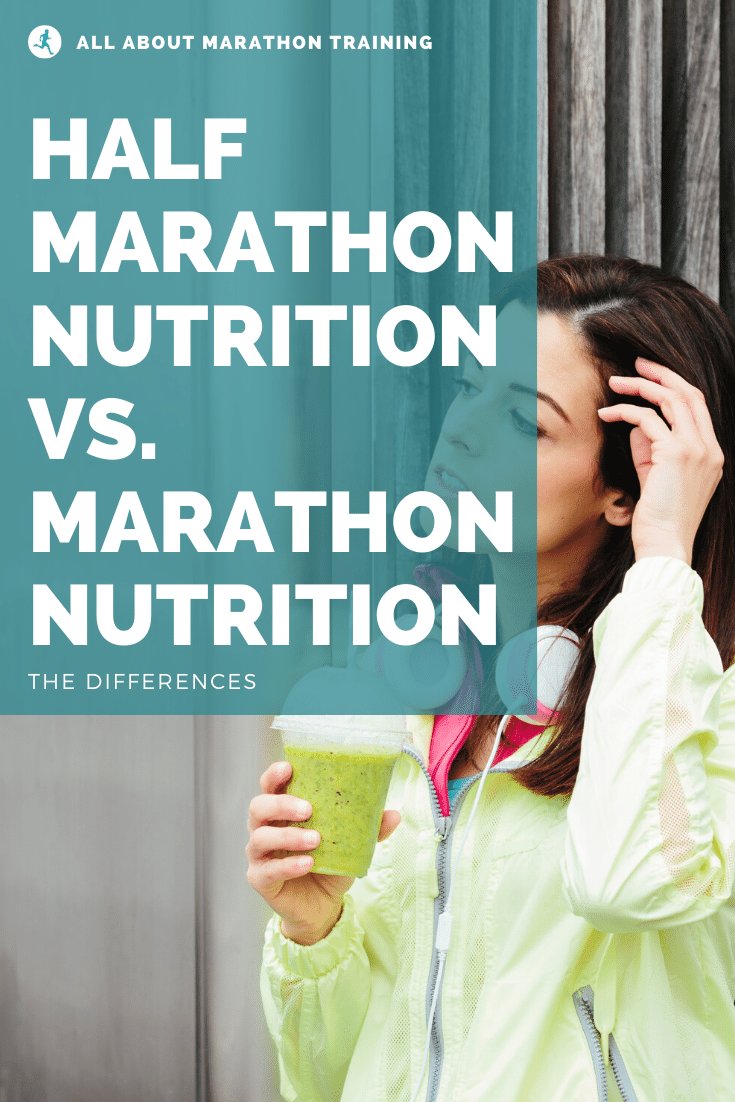


New! Comments
Have your say about what you just read! Leave me a comment in the box below.